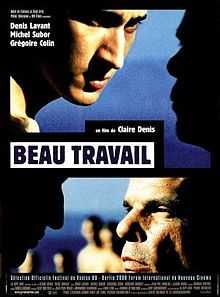Beau Travail
| Beau Travail | |
|---|---|
 Theatrical release poster | |
| Directed by | Claire Denis |
| Produced by | Patrick Grandperret |
| Written by | Claire Denis |
| Music by | Charles Henri de Pierrefeu |
| Cinematography | Agnès Godard |
| Editing by | Nelly Quettier |
| Distributed by | Pyramide Distribution |
| Release dates | 1999 |
| Running time | 90 minutes |
| Country | France |
| Language | French, Italian, Russian |
Beau Travail is a 1999 French movie directed by Claire Denis that is loosely based on Herman Melville's novella Billy Budd. She has set the movie in Djibouti, where the protagonists are soldiers in the French Foreign Legion. Parts of the soundtrack of the movie are from Benjamin Britten's opera based on the novella.
Plot
Back in France, master sergeant Galoup (Denis Lavant) remembers the time in the desert, where he led his men under the command of Bruno Forestier (Michel Subor). His life had routine duties, such as supervising the physical exercise of his men.
One day, his troop is joined by Gilles Sentain (Grégoire Colin), whose physical beauty, social skills, and fortitude make Galoup envious. Repressed homosexual feelings of Galoup are suggested.
When Sentain helps another soldier, violating previous orders by Galoup, the sergeant sees a chance to destroy him. As a punishment, he drives Sentain out into the desert to make him walk back to the base. But Sentain does not return because Galoup has tampered with his compass, and the soldier is lost without it.
Even though Sentain is later found and rescued by a group of Djiboutis, Galoup is sent back to France by his commander for a court martial. It ends his career in the Foreign Legion. The final scene, a metaphoric dance, suggests his suicide.
Production
In an interview, Denis said, "One of the cast had actually been in the Legion, so we took all their real exercises and did them together every day, to concentrate the actors as a group. We never said we were going to choreograph the film. But afterwards, when we started shooting, using Britten's music, those exercises became like a dance."[1]
Reception
The film was highly acclaimed in the United States, topping the Village Voice's Film Critics' Poll in 2000, with Claire Denis also placing at #2 for best director.[2] Jonathan Rosenbaum of the Chicago Reader rated it a "masterpiece," giving it the paper's highest rating of four stars.[3] Charles Taylor of Salon.com wrote that "Beau Travail is the most extreme example of [Denis'] talent, baffling and exhilarating. I don't know when I've seen a movie that is in so many ways foreign to what draws me to movies and still felt under a spell."[4] Peter Travers of Rolling Stone gave it the magazine's highest rating, calling it "unique and unforgettable."[5] J. Hoberman of the Village Voice wrote that the film is "so tactile in its cinematography, inventive in its camera placement, and sensuous in its editing that the purposefully oblique and languid narrative is all but eclipsed."[6]
The review aggregator website, Metacritic, gave the film a score of 91, which they characterized as "universal acclaim."[7]
References
- ↑ Interview: Claire Denis and Beau Travail, Daily Telegraph, 16 August 2003
- ↑ Village Voice
- ↑ JonathanRosenbaum.net
- ↑ Salon.com
- ↑ Metacritic.com
- ↑ J. Hoberman, "Review: Beau Travail", Village Voice
- ↑ Beau Travail, Metacritic.com
External links
- Beau Travail at the Internet Movie Database
- Beau Travail at Rotten Tomatoes
- Beau Travail at Metacritic
| |||||